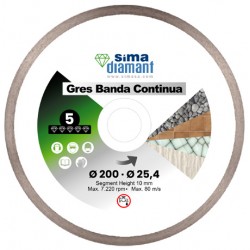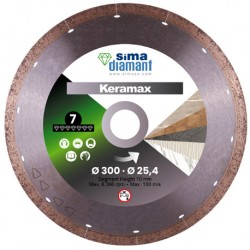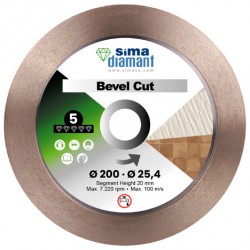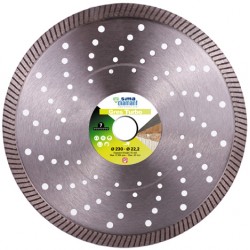

Diamond Blade for Wet Cutting Range: SIMA Diamant
Materials: Gres, Ceramics, Porcelain, Stone. Diameter: 350 mm Laser welded segment.


Diamond Blade for Wet Cutting Range: SIMA Diamant
Materials: Gres, Ceramics, Porcelain, Stone. Diameter: 350 mm Laser welded segment.


Diamond Blade for Wet Cutting Range: SIMA Diamant
Materials: Gres, Ceramics, Porcelain, Marble, Dekton. Diameter: 300 mm Laser welded segment.


Diamond Blade for Wet Cutting Range: SIMA Diamant
Materials: Gres, Ceramics. Diameter: 250 mm Laser welded segment.


Diamond Blade for Dry Cutting Range: SIMA Diamant
Materials: Granite, Gres, Ceramics, Dekton. Diameter: 230 mm Laser welded segment.
Using porcelain to beautify both the interior of your home and the exterior of your patio has had a big spread in the last few years. Why porcelain? Well, this trend comes not only from the soft touch that this type of ceramic offers but also from its hardness or mechanical resistance, the whiteness and translucency, the low porosity and of course, its durability. So, if you are looking for this kind of change, porcelain might be your best ally.
However, you need the perfect tools to work with it as it is fragile when shaping it into place. It is key to find the best diamond blade for porcelain tiles. Diamond saw blades for porcelain tiles are perfect for cutting hard and abrasive materials and other than their finished edges thanks to the synthetic diamond particles fixed on their edges.
They offer great resistance, and they are thin and capable of high cutting speed. Besides, a porcelain diamond blade is generally suitable for cutting other ceramics, granite, asphalt, concrete, bricks, glass and marble. This is possible because diamond blades do not actually cut, but grind. The exposed diamond particles grind while the metal bond keeps them in place.
Of course, after working with the diamond blade for a few hours it starts to deteriorate, but if you work with it properly, it can provide a long service life. Your best option is wet cutting as the waterflow prevents the blade from overheating. Moreover, it is generally safer for the user and will prevent the porcelain tiles from chipping or cracking. However, if you are using electrical tools or there is an electrical power source near your workplace, it might be better to dry cut. In this case, you should use a respirator mask to protect yourself from breathing silica dust.